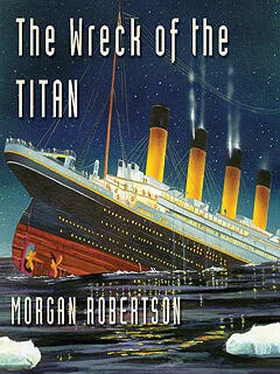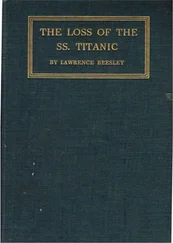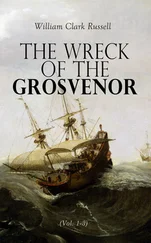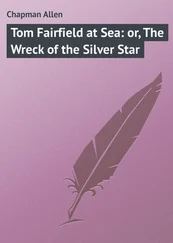Hard aport, sir—ship on the starboard tack—dead ahead” came the cry.
“Port your wheel—hard over,” repeated the first officer to the quartermaster at the helm—who answered and obeyed. Nothing as yet could be seen from the bridge. The powerful steering-engine in the stern ground the rudder over; but before three degrees on the compass card were traversed by the lubber’s-point, a seeming thickening of the darkness and fog ahead resolved itself into the square sails of a deep-laden ship, crossing the Titan’s bow, not half her length away.
“H—l and d—” growled the first officer. Steady on your course, quartermaster,” he shouted. “Stand from under on deck.” He turned a lever which closed compartments, pushed a button marked—“Captain’s Room,” and crouched down, awaiting the crash.
There was hardly a crash. A slight jar shook the forward end of the Titan and sliding down her foretopmast-stay and rattling on deck came a shower of small spars, sails, blocks, and wire rope. Then, in the darkness to starboard and port, two darker shapes shot by—the two halves of the ship she had cut through; and from one of these shapes, where still burned a binnacle light, was heard, high above the confused murmur of shouts and shrieks, a sailorly voice:
“May the curse of God light on you and your cheese-knife, you brass-bound murderers.”
The shapes were swallowed in the blackness astern; the cries were hushed by the clamor of the gale, and the steamship Titan swung back to her course. The first officer had not turned the lever of the engine-room telegraph.
The boatswain bounded up the steps of the bridge for instructions.
“Put men at the batches and doors. Send every one who comes on deck to the chart-room. Tell the watchman to notice what the passengers have learned, and clear away that wreck forward as soon as possible.” The voice of the officer was hoarse and strained as he gave these directions, and the “aye, aye, sir” of the boatswain was uttered in a gasp.
THE crow’s-nest “lookout,” sixty feet above the deck, had seen every detail of the horror, from the moment when the upper sails of the doomed ship had appeared to him above the fog to the time when the last tangle of wreckage was cut away by his watchmates below. When relieved at four bells, he descended with as little strength in his limbs as was compatible with safety in the rigging. At the rail, the boatswain met him.
“Report your relief, Rowland,” he said, “and go into the chart-room!”
On the bridge, as he gave the name of his successor, the first officer seized his hand, pressed it, and repeated the boatswain’s order. In the chart-room, he found the captain of the Titan , pale-faced and intense in manner, seated at a table, and, grouped around him, the whole of the watch on deck except the officers, lookouts, and quartermasters. The cabin watchmen were there, and some of the watch below, among whom were stokers and coal-passers, and also, a few of the idlers—lampmen, yeomen, and butchers, who, sleeping forward, had been awakened by the terrific blow of the great hollow knife within which they lived.
Three carpenters’ mates stood by the door, with sounding-rods in their hands, which they had just shown the captain—dry. Every face, from the captain’s down, wore a look of horror and expectancy. A quartermaster followed Rowland in and said:
“Engineer felt no jar in the engine-room, sir; and there’s no excitement in the stokehold.”
“And you watchmen report no alarm in the cabins. How about the steerage? Is that man back?” asked the captain. Another watchman appeared as he spoke.
“All asleep in the steerage, sir,” he said. Then a quartermaster entered with the same report of the forecastles.
“Very well,” said the captain, rising; “one by one come into my office—watchmen first, then petty officers, then the men. Quartermasters will watch the door—that no man goes out until I have seen him.” He passed into another room, followed by a watchman, who presently emerged and went on deck with a more pleasant expression of face. Another entered and came out; then another, and another, until every man but Rowland had been within the sacred precincts, all to wear the same pleased, or satisfied, look on reappearing. When Rowland entered, the captain, seated at a desk, motioned him to a chair, and asked his name.
“John Rowland,” he answered. The captain wrote it down.
“I understand,” he said, “that you were in the crow’s-nest when this unfortunate collision occurred.”
“Yes, sir; and I reported the ship as soon as I saw her.”
“You are not here to be censured. You are aware, of course, that nothing could be done, either to avert this terrible calamity, or to save life afterward.”
“Nothing at a speed of twenty-five knots an hour in a thick fog, sir.” The captain glanced sharply at Rowland and frowned.
“We will not discuss the speed of the ship, my good man,” he said, “or the rules of the company. You will find, when you are paid at Liverpool, a package addressed to you at the company’s office containing one hundred pounds in banknotes. This, you will receive for your silence in regard to this collision—the reporting of which would embarrass the company and help no one.”
“On the contrary, captain, I shall not receive it. On the contrary, sir, I shall speak of this wholesale murder at the first opportunity!”
The captain leaned back and stared at the debauched face, the trembling figure of the sailor, with which this defiant speech so little accorded. Under ordinary circumstances, he would have sent him on deck to be dealt with by the officers. But this was not an ordinary circumstance. In the watery eyes was a look of shock, and horror, and honest indignation; the accents were those of an educated man; and the consequences hanging over himself and the company for which he worked—already complicated by and involved in his efforts to avoid them—which this man might precipitate, were so extreme, that such questions as insolence and difference in rank were not to be thought of. He must meet and subdue this Tartar on common ground—as man to man.
“Are you aware, Rowland,” he asked, quietly, “that you will stand alone—that you will be discredited, lose your berth, and make enemies?”
“I am aware of more than that,” answered Rowland, excitedly. “I know of the power vested in you as captain. I know that you can order me into irons from this room for any offense you wish to imagine. And I know that an unwitnessed, uncorroborated entry in your official log concerning me would be evidence enough to bring me life imprisonment. But I also know something of admiralty law; that from my prison cell I can send you and your first officer to the gallows.”
“You are mistaken in your conceptions of evidence. I could not cause your conviction by a log-book entry; nor could you, from a prison, injure me. What are you, may I ask—an ex-lawyer?”
“A graduate of Annapolis. Your equal in professional technic.”
“And you have interest at Washington?”
“None whatever.”
“And what is your object in taking this stand—which can do you no possible good, though certainly not the harm you speak of?”
“That I may do one good, strong act in my useless life—that I may help to arouse such a sentiment of anger in the two countries as will forever end this wanton destruction of life and property for the sake of speed-that will save the hundreds of fishing-craft, and others, run down yearly, to their owners, and the crews to their families.”
Both men had risen and the captain was pacing the floor as Rowland, with flashing eyes and clinched fists, delivered this declaration.
Читать дальше











